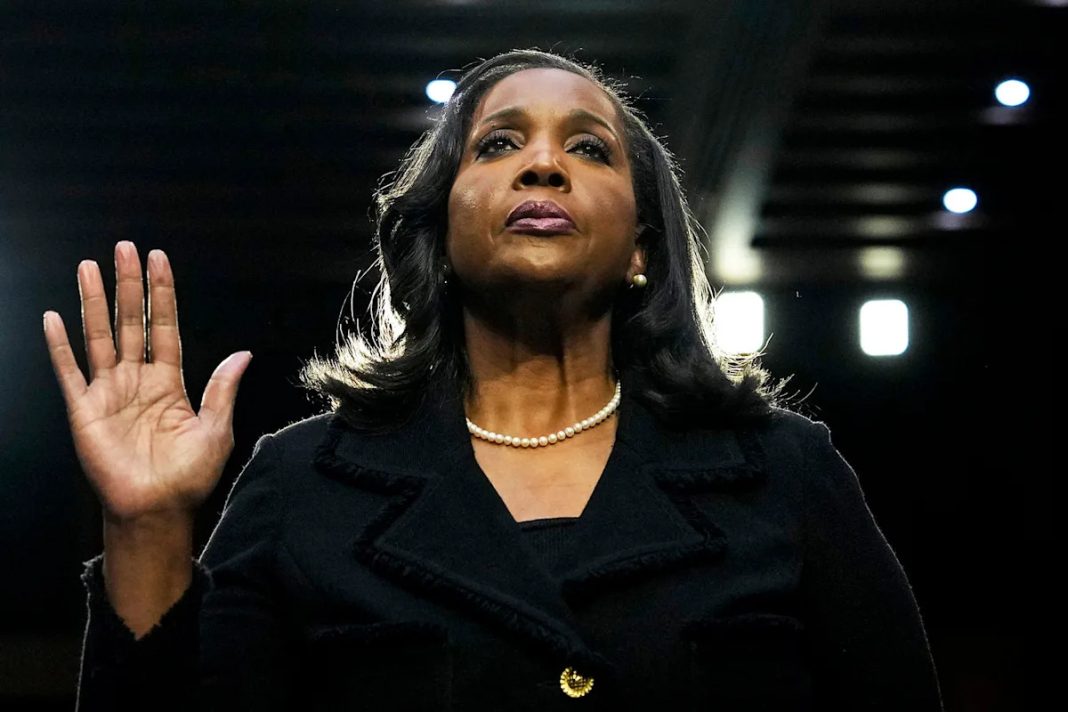President Donald Trump’s bid to fire Lisa Cook from the Federal Reserve is now at the Supreme Court. It’s the latest legal test of Trump’s power in his second term, and it carries great practical implications for the economy.
In an application Thursday, the administration asked the high court to lift a district judge’s order that’s keeping Cook on the central bank board as her lawsuit proceeds against Trump’s attempt to fire her. Issuing that preliminary order Sept. 9., U.S. District Judge Jia Cobb reasoned that Cook would likely succeed in the litigation.
A divided federal appeals court panel declined to lift Cobb’s order Monday, ahead of a key two-day Fed meeting on monetary policy and other matters. Trump has been pressing the central bank to lower interest rates, which it did Wednesday, but not as steeply as new board member Stephen Miran wanted. Miran was appointed by Trump and confirmed Monday by the Republican-led Senate. Miran’s Trump-aligned dissent shows how the president hopes to shape the historically independent board and how the GOP-led Senate will let him — unless checked by the courts.
A challenge for Trump in fully controlling the board is that the Federal Reserve Act says the president can only remove board members for cause. And while the Supreme Court has been letting Trump fire members of other agencies without cause, the Republican-appointed high court majority went out of its way earlier this year to signal that it won’t let Trump do so with the Fed.
So the president seemingly needed to come up with a reason to fire Cook. That’s apparently what led his administration to develop the claim that she committed mortgage fraud prior to her Senate confirmation (her term expires in 2038). The board’s staggered terms are designed to insulate members from the whims of a given presidential administration. Recent reporting suggests the fraud claim might be false, and Cook hasn’t been criminally charged with any fraud.
But whether she stays on the board won’t necessarily turn on whether she actually committed fraud. If the Supreme Court says judges can’t examine the president’s motives — as the majority said when it approved Trump’s travel ban in his first term — then whether Trump’s fraud claim is completely made up or not won’t matter. All the president would have to do is claim he has cause to fire Cook (or anyone else) and the effect would be the same as the court saying he can fire anyone without cause.
While we don’t know how the justices will resolve the historic dispute, it’s worth keeping in mind that the appellate decision Monday to keep Cobb’s order in place came over a dissent from Trump appointee Gregory Katsas. His view of the case might more closely resemble the high court majority’s view.
The two judges in the appellate panel majority, Michelle Childs and Bradley Garcia, are Biden appointees (as are Cobb and Cook). In siding with Cook, they focused on due process, noting that the administration “does not dispute that it failed to provide Cook even minimal process — that is, notice of the allegation against her and a meaningful opportunity to respond — before she was purportedly removed.” In his dissent, Katsas wrote that Cobb was wrong to rule that Cook 1) had a constitutionally protected property interest in her office; and that 2) she can’t be removed based on conduct prior to her appointment.
The administration cited Katsas’ dissent in its application Thursday, casting Cobb as the latest lower court judge to stand in the way of Trump’s power. “This application involves yet another case of improper judicial interference with the President’s removal authority — here, interference with the President’s authority to remove members of the Federal Reserve Board of Governors for cause,” U.S. Solicitor General John Sauer wrote, calling due process “a flexible concept.” He wrote that if “the President provides no reason at all for removing a member, a court could properly review that decision. But once the President identifies a cause, judicial review must cease.”
When she filed her lawsuit in late August, Cook called Trump’s attempt to fire her “unprecedented and illegal.” Underscoring the stakes in her civil complaint, she noted that Fed independence “is vital to its ability to make sound economic decisions, free from the political pressures of an election cycle.” She warned that if “markets and the public believe that the central bank is making decisions based on political pressure rather than sound economic data, that confidence erodes.”
In her ruling to keep Cook on the board while her suit proceeds, Judge Cobb noted that the case involves “the first purported ‘for cause’ removal of a Board Governor in the Federal Reserve’s 111-year history,” and that it “raises important matters of first impression,” meaning issues that haven’t been legally resolved by courts before.
Subscribe to the Deadline: Legal Newsletter for expert analysis on the top legal stories of the week, including updates from the Supreme Court and developments in the Trump administration’s legal cases.
This article was originally published on MSNBC.com

